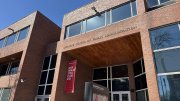President Drew Faust’s Morning Prayers address in Appleton Chapel on September 16
This chapel, this church represent places where we stop for a moment or an hour outside our usual work and lives to consider the larger meaning of what we do. It is also a place where we think beyond our own individual ambitions and achievements to reflect upon our obligations to one another and to a wider world.
Today I want to speak about one such obligation, one I am asking our community to take on with new focus and new force. It is an obligation to our children and to their children, and it is in one sense a quite simple matter of human self-interest and survival. But it is also a question with deeply spiritual implications concerning what we owe not just to one another and our descendants but to whatever god or transcendent being or divine force we might believe in. What I want to talk about today is the preservation of the world—its glaciers, its forests, its waterways, its species—in the face of the crisis of global warming and environmental change.
Among the most powerful memories of my childhood experiences in church and Sunday School are hymns that still echo in my mind. And a great many of those hymns are songs of praise and thanksgiving for creation’s wonders. “Fair are the meadows; fairer still the woodlands.” Or perhaps for me and so many others, most memorably:
All things bright and beautiful,
All creatures great and small,
All things wise and wonderful,
The Lord God made them all.Each little flower that opens,
Each little bird that sings,
He made their glowing colors,
He made their tiny wings.
Written in 1848, the words to this hymn are steeped in Victorian romanticism, extolling the glowing colors of each little flower, the tiny wings of each little bird. Its rather treacly sentimentality and continuing popularity in a far more cynical age moved Monty Python to parody:
All things dull and ugly
All creatures short and squat
All things rude and nasty
The Lord God made the lot.Each nasty little hornet,
Each beastly little squid
Who made the spiky urchin?
Who made the sharks? He did!
But Monty Python’s mockery actually reinforces, rather than rejects, my fundamental point: Urchins, squid, hornets, sharks matter too. They play an essential part in what we might call the wonders of biodiversity.
Yet we humans of the twenty-first century seem to be doing our best to destroy that wondrous creation. Pollution and climate change, habitat destruction and species extinction are growing threats to the world we have inherited and the world we will bequeath to our descendants—the creation we steward for purposes far larger than ourselves.
In July, I announced a new initiative for Harvard indicating that Harvard would be making an ambitious commitment to reducing its emission of greenhouse gases in an effort to lessen our carbon footprint and our contributions to global warming.* The goals we have set will not be easy to attain; they will require all of us to change assumptions and behavior, to live with enhanced consciousness and responsibility about our stewardship of the earth. And we will at the same time commit our intellectual resources as an institution devoted to learning and discovery, to explore policies and technologies that can make a significant difference in the crisis of sustainability that we face. In our work as students and scholars, in our lives as members of this community we must commit ourselves to preserving this wondrous creation all around us. However we may differ in our religious explanations and understandings, our lives are deeply intertwined and interdependent—with one another and with this world which we cannot permit to perish. To borrow words from the old hymn: We must be wise to preserve what is wonderful.
*See “Environmental Action,” September-October, page 57.








